Britain 1945 to 1975
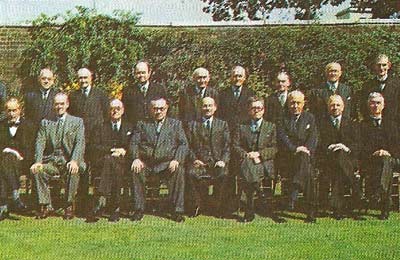
Figure 1. A landslide victory brought Labour to power in 1945 with 393 seats against the 213 won by the Conservatives and their allies. The Conservatives and most foreign observers had assumed that Churchill, with his great wartime prestige, would carry them to victory. But the electorate was moved by Labour's promises of employment, housing and welfare and the proposals for nationalization of basic industries and state planning of the massive reconstruction that lay ahead. Years of wartime organization had left the people with a collectivist legacy that gave a strong appeal to Labour's socialist program.
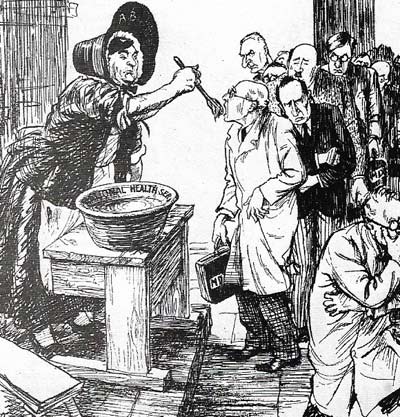
Figure 2. The centerpiece of the new Welfare State was the National Health Service, whose creation was the work of Aneurin Bevan. For the first time medical attention, prescriptions, and many other services, generally became free or available on low charges. Some 3,000 hospitals were taken over under the scheme. While the hospital consultants welcome the proposal, most of the doctors, organized by the British Medical Association, were bitterly opposed to it, as depicted in this contemporary cartoon.
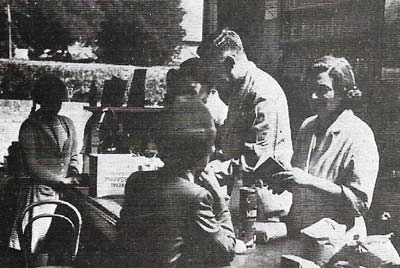
Figure 3. Rationing in the postwar period was more severe than in wartime. Until its defeat in 1951, the Labour government pursued an unpopular program of austerity to rebuild the economy and finance government expenditure. Abroad things were serious; in the Netherlands and the British zone in Germany there was near famine and there was a lack of raw materials all over the world. But ironically a higher percentage of each age group in the London area in 1946 was classed as of "excellent nutrition" than in 1938, and this was true of the country as a whole. Rationing began to be reduced after 1948; in 1949 clothing and furniture were freed. Meat was the last item to disappear from the ration books, and that took place in 1954.
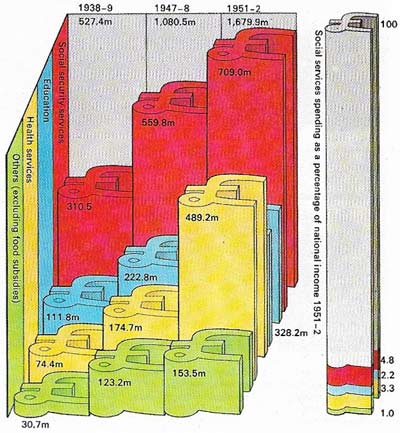
Figure 4. Figures for spending on the social services illustrate the economic reality behind the creation of the Welfare State. In 1938, the last full budgetary year before the war, social service spending was around £345 million or 37.6 percent of total government expenditure; by 1950 this proportion had risen to 46.1 percent. In 1955, R. A. Butler pointed out that during his period as Chancellor of the Exchequer, social service spending has increased by 40 percent while the national income had increased by only 25 percent. But government expenditure on defense remained high. The limited rearmament undertaken at the time of the Korean War (1950-1953) deeply divided the Labour Party.
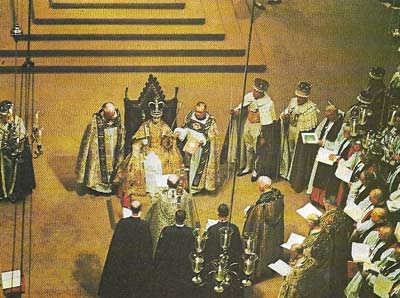
Figure 5. The coronation of Queen Elizabeth II in June 1953 was taken by many to symbolize a new "Elizabethan Age" with the promise of great prospects for Britain in the postwar world. The event was televized worldwide and thousands of cheering spectators lined the streets to watch the colorful procession.
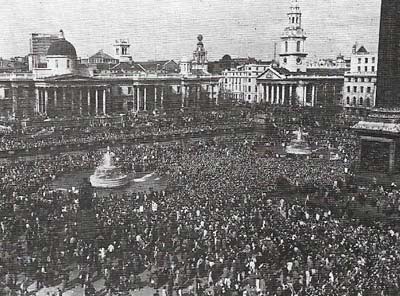
Figure 6. Ban-the-bomb demonstrations were frequent after the CND (campaign for Nuclear Disarmament) was founded in 1958. Many public figures shared this widespread concern.
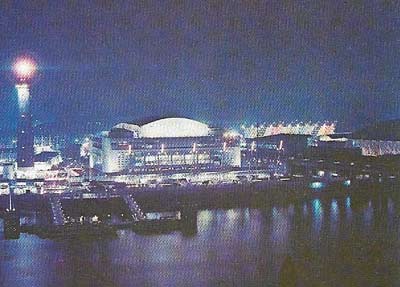
Figure 7. The Festival of Britain in 1951 was conceived as marking a new era of reconstruction following the destruction of World War II. Opened by George VI (r. 1936–1952) on 3 May, it attracted 8.5 million visitors to the Festival Hall and other sights on the south bank of the River Thames.
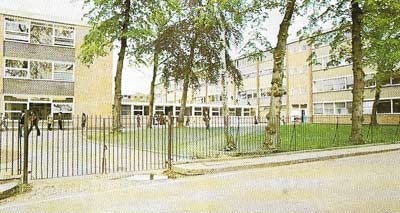
Figure 8. Holland Park Comprehensive made news as a large purpose-built (1958) school in a fashionable part of London to which some public figures sent their children. With its sixth form block, ten science laboratories, ten art studios, seven workshops and three gymnasiums, it summed up the aspirations of a new style education system based on the principle of giving all children, no matter what their background or means, equal opportunity. As some academic standards slipped, however, Labours' policy of replacing grammar, secondary modern and grant-aided schools by comprehensives provoked increasingly fierce controversy.
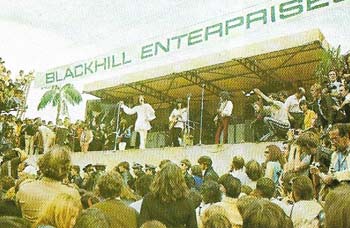
Figure 9. Mick Jagger and the Rolling Stones, seen here at a 1969 concert in Hyde Park, London, were the most aggressive, irreverent, antiestablishment rock group to appear in the entertainment world of the 1960s. Their appeal was less broadly based than that of the Beatles, whose popularity with virtually all age groups helped to break down some of the traditional barriers of class and accent in Britain. The driving music of the Rolling Stones was directed more frankly at youthful rebellion. It chimed in with trends of the times, reflected in the increasingly open treatment of sex and violence in films and on television, and the use of drugs as stimulants on a scale previously unknown.

Figure 10. Inflation had been at the rate of 3% to 4% from 1945 until 1964, fuelled by the steady increase of government spending and the outpacing of production increases by wage rises. The rate of inflation jumped when the 14.3% devaluation of the pound in 1967 put up the prices of imported goods. From 1973 onwards, price rises imposed by the Organisation of Petroleum Exporting Countries (OPEC) doubled the price of oil. Soaring costs and wages in 1975 brought inflation to 20%. Government efforts to hold down spending, together with some company failures, led to a rise in the number of unemployed to more than 1 million, the worst level of unemployment since the 1930s.
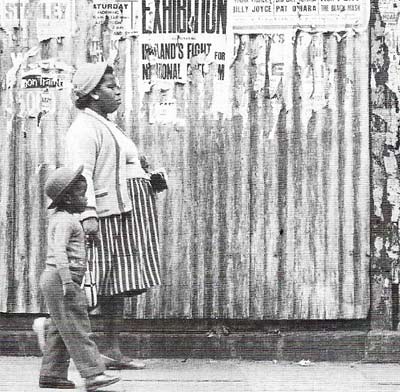
Figure 11. Immigrants from the West Indies and Asia provided staff for medical, transport and postal services and for certain industries, notably textiles, after World War II. But their rising numbers and limited prospects brought social strains while problems of housing and education led to government measures to regulate their entry during the 1960s. The entry restrictions were partially waived to accommodate Asians holding British passports expelled from Uganda in 1972. community services and immigration liaison offices were set up in several cities to help with their integration and improve race relations.
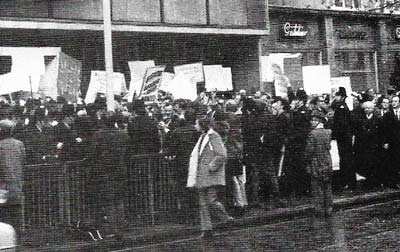
Figure 12. Striking miners in 1972 supported wage claims of up to 47% made by the National Union of Miners at a time when the Conservative Government was hoping to bring inflation down from 6% to 5%. Rejecting increases of between 7% and 8%, miners picketed generating stations until power shortages forced the government to set up an enquiry. The strike from 9 January to 28 February, ended with acceptance of increases averaging 25% recommended by a court of inquiry. Further miners' claims in 1973 were resisted by the government but its handling of the economy led to defeat in the 1974 election.
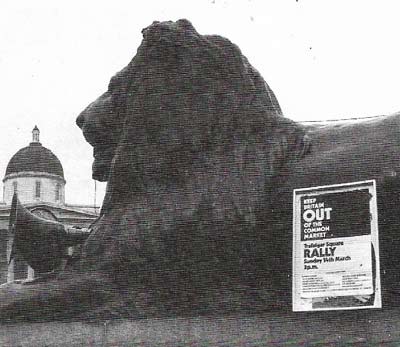
Figure 13. A last-ditch fight against Britain's entry into the EEC was defeated when a referendum in 1975 produced a 67% vote in favor of continued membership of the Community. A large section of the Labour Party, particularly the left-wing Tribune Group, had opposed Britain's joining in 1973.
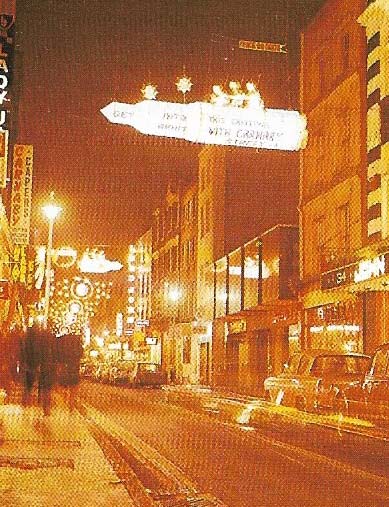
Figure 14. Carnaby Street, with its boutiques and shops specializing in fashionable clothes, colorful posters and the latest pop records, became a symbol for the new "swinging" London of the 1960s. Together with King's Road, Chelsea, it provided, a visual idea of a city that had cast of the imperial trappings of the past. London was now the capital of the youth orientated societies of the affluent Western countries, a youth whose tastes and demands needed up-to-the-minute satisfaction. One of the most popular of Carnaby Street's emblems was the Union Jack itself, converted from the national flag to almost anything, from a lively T-shirt to a plastic shopping bag.
After six years of war Britain's return to peacetime conditions needed a prolonged period of adjustment. Despite the remarkably united and disciplined war effort, the country's economy had been overstrained, and Britain was not in a position to shoulder properly the burdens of occupying its zone of Western Germany while also playing its part in achieving some kind of peace settlement in the East as well as in the West.
Labour victory and the Welfare State
Although Britain still ranked as one of the "Big Three" powers when the war ended, along with the United States and the Soviet Union, it soon became clear that it was no longer in the super-power league. At the 1945 general election, the bulk of the electorate showed that it was more interested in the approach to peacetime reconstruction offered by the Labour Party than in the continuation of Britain's role in big-power politics which it associated with Winston Churchill (1874–1965), linked as that would have been with a period of Conservative rule. A landslide victory for Labour deprived the country of the world figure who had been – not just for the British but for millions elsewhere – the personification of resistance to Nazism and Fascism. Clement Attlee (1883–1967) became prime minister.
Ernest Bevin (1881–1951) as Foreign Secretary supplied something of Churchill's bulldog quality in the negotiations that began to shape the peacetime settlement. At the same time he and others undertook the vast work of decolonization, starting with the granting of independence to India and Pakistan in 1947.
Domestic changes were almost as dramatic as those taking place outside Britain. The government's brand of socialism stressed nationalization of various sectors of the economy as the way forward, while greatly extending the state health and medical services and education, creating a "Welfare State" (Figure 4). The Bank of England was nationalized in 1946 and in 1947 the railways and the coal mines were also taken under state control. The steel industry was also nationalized, in 1947, after a constitutional crisis brought on by Conservative opposition in the House of Lords, whose power to delay bills was subsequently reduced. What affected people most directly was the massive reorganization of the Health Services (Figure 2), accomplished by Aneurin Bevan (1897–1960), in order to provide medical and hospital treatment and prescriptions and also dental and other services "free", or at minimal rates.
The government had inherited a wartime economy. It continued rationing (not completely ended until 1954) and also policies of heavy taxation and wage restraint. Despite a large increase in exports, the country (or rather the sterling area as a whole) had an almost chronic deficit with the United States, which forced a devaluation of the pound from $4.03 to $2.80 in September 1949.
Conservative rule
Long-drawn-out opposition by the British Medical Association to the Health Service reforms, and bitter wrangling in Parliament over steel, indicated that Labour's popularity was waning. At the 1950 election Labour was returned to power with a reduced majority, and at the following election in October 1951 the Conservatives under Churchill won a majority of 26. With this they de-nationalized the steel industry in 1953 (it was later re-nationalized by Labour in 1967).
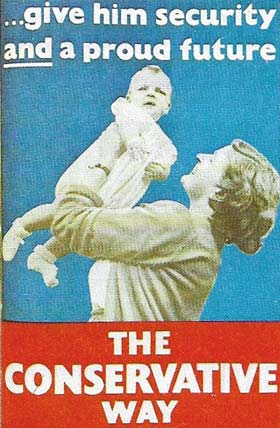 |
| The 1950 election had returned Labour to power with a majority of only five. In 1951 under increasing pressure, the government resigned in an election that gave the Conservative Party a majority of 26. The Conservatives presented an attractive alternative after the prolonged austerity of the preceding years. |
The Chancellor of the Exchequer, Richard ("Rab") Butler (1902–1982), introduced a series of measures designed to improve the balance of payments and to increase domestic consumption. In the 1955 election the Conservatives were returned with an increased majority. The party was now led by Anthony Eden (1897–1977) who had taken over the leadership after Churchill had resigned through ill health.
In addition to maintaining an independent nuclear deterrent (Figure 6) and continuing national service (until 1958), the government favored British influence and defense commitments overseas on a scale that the economy could no longer support. The failure in 1956 of the Suez operation against Egypt, when the collusion of Britain and France with Israel was opposed by America, made it clear that Britain could no longer continue the stance of a world power.
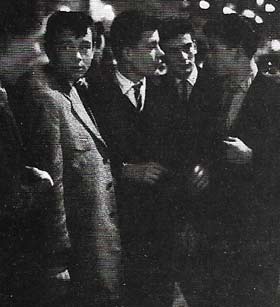 |
| A new youth culture emerged in the 1950s, alongside the beginnings of rock'n'roll music, which presaged predominant youth cultures of the 1960s. Like the music, the new style was aggressive and uncompromisingly youthful and reflected the new affluence of the postwar period. Styles included those worn by "Teddy Boys", who affected Edwardian-style suits, string ties, and duck's-tail haircuts. |
Meanwhile, thanks in part to vast infusions of dollars through US loans and Marshall Aid, the economy had a run of good years. The standard of living rose, and the working classes, like most of the population, had "never had it so good". These words of Harold Macmillan (1894–1986), who became prime minister following Anthony Eden's resignation in 1957, can serve as a motto for this final phase of the 13 years of Conservative rule (1951–1964).
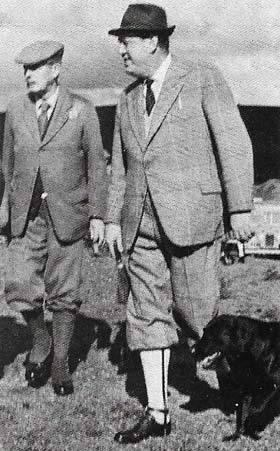 |
| Harold McMillan (left) was prime minister for six years from 1957 to 1963 until he retired from the Conservative leadership because of ill health. During that time the country had a period of prosperous and efficient government, although the economic problems that dominated British politics in the late 1960s became evident during the final years of his term of office. |
Loss of confidence, return of Labour
In the early years of the 1960s the economy took a downward turn, however, and successive pay policies introduced by the Conservatives failed. Britain's application for membership of the European Economic Community was vetoed by France in 1963, and the Beeching report proposing a one-third reduction in railway services also undermined Macmillan's popularity. Sir Alec Douglas-Home (1903–1995), who took over the premiership after Macmillan had resigned because of illness in 1963, could not restore confidence.
The British general election of 1964 initiated a period of Labour rule broken only by nearly four years of Conservative government under Edward Heath (1970–1974). The period as a whole was one of increasing economic difficulty for Britain. It failed to maintain its competitive position against trade rivals despite its entry in 1973 into the European Economic Community (Common Market), an action that was reaffirmed after a referendum in 1975 (Figure 13). Only on the "invisible" side of its trading account (banking, brokerage, insurance and other services) did Britain maintain its position, thereby alleviating the effects of the frequent deficits in its balance of payments.
Trade union militancy
Trade imbalances were offset by loans that became ever more massive, despite a few better years when repayments were made, notably during the period 1967–1970. Among reasons for the weakness of trade were the increasing productivity of competitors, and their greater ability to adopt new methods and machinery both for older industries and for the new high-technology enterprises. In contrast, British management found it difficult to secure the cooperation of trade un-ions in introducing modern plant and reducing labor costs. This failure was coupled with successful union pressure for increased wages and reduced hours of work, backed by go-slows and strikes.
In Parliament the Labour Party was increasingly polarized between left-wing socialists of the Tribune Group and some Marxist-oriented MPs on the one hand, and those who pursued a moderate social-democratic line on the other.
Among the latter were Harold Wilson, prime minister 1964–1970 and 1974–1976, and James Callaghan, who followed him as prime minister. Wilson coped skillfully with the divisions in his party but at the cost of compromising over some important issues to the point where governmental authority was eroded. The continuing high cost of defense, together with growing education, health and pensions services, imposed burdens which the weakening position of the country in productivity and trade made it difficult to meet. This weakness was reflected in the tendency of inflation, which had been chronic but manageable (three to five percent), to increase to, at times, more than 20 percent. As a result, sterling weakened against other currencies (Figure 10).
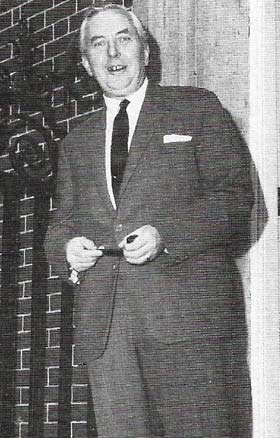 |
| Harold Wilson (1916-1995) became prime minister of a Labour government with a majority of only four in 1964. He consolidated his party's position at a further election in 1966. The youngest MP to attain cabinet rank in the first postwar government (at the Board of Trade), he took over the party leadership after the death of Hugh Gaitskell in 1963. Although his flexibility enabled him to hold together the left and right wings of his party, his hopes of modernizing the British economy and the trade union system were dashed first by the weakness of sterling and secondly by union opposition to sweeping changes. |
Devaluation of sterling
Labour's fine ideals in 1964 of modernizing Britain and moving it steadily towards socialism, were soon obscured by the fight to "save the pound". Desperate efforts were made to maintain the exchange rate of the pound at $US2.80 by large-scale borrowing from abroad – but to no avail. A seamen's strike in 1966 hastened the loss of confidence in sterling and the pound was devalued to $2.40 in November 1967. Attempts were made to bolster sterling by an incomes policy that restricted wage increases to certain ceilings or percentages. But the Labour program for pursuing this objective, formulated in the White Paper, "In Place of Strife", failed in 1969 in the face of union militancy and left-wing opposition.
The Conservative government from 1970–1974 fared no better in attempting to control inflation, and in fact worsened the position by dismantling some of Labour's controls, only to return to an incomes policy. Obdurate union resistance to pay restraints was exacerbated by the Industrial Relations Act, which established three-phase statutory wage and price controls. A coal-miners' strike (Figure 12) early in 1972, involving power-cuts when the miners obstructed coal deliveries to the generating stations, led to the treatment of the miners as a "special case". The 25 percent pay rise they received breached the incomes policy. The Government attempted to counteract an overtime ban by the miners the following winter by introducing an emergency three-day working week to save fuel. But when in 1974 it sought a mandate for a firm line against union pressure for higher wages, a general election resulted in the return of Labour to power without an overall majority.
Despite hopes of future prosperity through the development of North Sea gas and oil resources, the pound continued to sink, impelling a return to an incomes policy under the chancellorship of Denis Healey. To restrain a rising rate of unemployment (Figure 10), the government was forced to back some ailing firms with public money.
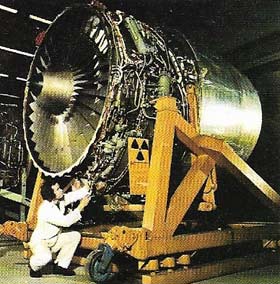 |
| Rolls-Royce engine manufacture was threatened in 1971 when the company's financial problems forced it to seek assistance from a Conservative government pledged to leave "lame duck" industries to their fate. The government had to take over those parts of the company essential to defense. A similar crisis in 1975 in the American-based Chrysler company obliged the Labour government to inject £162.5 million to save the jobs of car plant workers. |
Political and social strains
Economic weakness aggravated political problems. Proposals were made for devolution of some powers to local assemblies in response to demands for greater autonomy and even independence by parties in Scotland and Wales. In Northern Ireland, terrorist activity by the Irish Republican Army (IRA) and counter-terrorism by Protestant extremists led in 1972 to direct rule from Westminster, supported by large-scale and continuing army operations.
Socially, the strains of a further influx of Commonwealth migrants (Figure 11), major changes in patterns of education (Figure 8) and a shift in economic power from the older to the younger generation met with mixed success during the period after 1964. Pop music groups such as the Beatles and the Rolling Stones (Figure 9) were associated with a new image of London as the "swinging" capital (Figure 14).
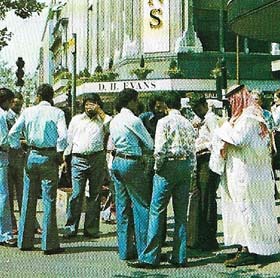 |
| Arabs shopping in London became a new feature of life in the capital during the 1970s, reflecting rising incomes in the oil states of the Middle East, particularly Saudi Arabia and Kuwait. At the same time sterling balances held by the oil states became a key factor in Britain's management of her currency reserves. Arab investors in the UK tended to favor buying real estate, such as the Dorchester hotel, rather than shares in British industry. |
